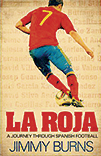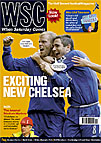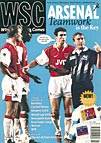Search: ' Luis Aragones'
Stories
Embed from Getty Images
Vicente del Bosque was out-thought by Antonio Conte and it’s time for a change
`
30 June ~ It’s the end of an era. After Spain’s early exit of Euro 2016, Spanish fans and media agreed that La Roja’s dominance of international football is over. The so called “tranquil transition” led by manager Vicente del Bosque after the shocking flop at the 2014 World Cup hasn’t been successful. Now, broader changes are required.
 A journey through Spanish football
A journey through Spanish football
by Jimmy Burns
Simon & Schuster, £18.99
Reviewed by Dermot Corrigan
From WSC 305 July 2012
The current golden era for Spain’s national team is also a boom time for publishers and authors producing books in English about the Spanish game. La Roja by Jimmy Burns is nicely timed for Euro 2012.
Burns has deeper links within Spanish society than most observers. His father Tom was a spy in Madrid during the Second World War and a Madrid metro station is named after his grandfather Gregorio Marañon. His closeness to issues outside sport soon emerges. Don Quixote shows up on page one and General Franco, ETA, recent president José Luis Zapatero and 19th century English travelwriter Richard Ford are all mentioned early on. None of them played much football, but they help argue that Spanish politics and culture shaped the country’s football team.
Whereas in Phil Ball’s Morbo you hear from taxi-drivers and local barmen, Burns draws in Federico García Lorca, Wilfred the Hairy and St Ignatius of Loyola. At times there are too many digressions into bullfighting theory and references to Quixote tilting at windmills. Another minor quibble is the recycling of anecdotes and interviews from Burns’s previous books on Barcelona, Diego Maradona and David Beckham. Ardal O’Hanlon’s thoughts on Catalan nationalism could have been left out.
But when a club president (Barcelona’s Josep Sunyol) can be shot for his political beliefs or a stadium can become the safest place for voicing political dissent (Athletic Bilbao’s San Mames), a broad approach makes sense. Many of the central influences on Spain’s footballing development, from Santiago Bernabéu to Johan Cruyff, were not shy about voicing strong political opinions. A paragraph in a football book that begins with the inauguration of Real Madrid’s new stadium and ends with a military coup is novel. The story of how Athletic players heard about the Luftwaffe’s bombing of Guernica while on a tour of France is moving.
Burns’s central point makes sense; Spain ditched its cultural and historical baggage, found its own football identity and suddenly became very, very good. For the entire 20th century, the national team was la furia Española – virile, aggressive and played by men with big cojones. When Luís Aragones changed the nickname to La Roja, some thought immediately of the losing “reds” from the civil war, but for Aragones it was just a colour like Italy’s Azzurri or Holland’s Oranje. Then Vicente del Bosque – from a republican family but a successful player and coach at Real Madrid – built his World Cup-winning team around a core of tiki-taka-loving Catalans.
The book is about this cultural shift. There are interviews with central figures, including Cruyff, Del Bosque, Jorge Valdano and Ladislav Kubala, but not much time is spent analysing tactics or youth systems. Burns’s central concern is not whether David Silva can play as a false nine, but how Spain’s football team represent the people (or peoples) found within its current borders. He succeeds in telling that story.
 Saturday 2 Arsenal rampage past Charlton, 4-0 at Highbury. “He’s the most exciting player anywhere,” says Alan Curbishley of two-goal Thierry. Everton’s good run comes to an end with a 1-0 defeat to Spurs in a bad-tempered game highlighted by Jamie Redknapp’s clogging of Tim Cahill, which may be referred to the FA. “It was a momentous effort,” says Gary Megson, surrounded by streamers and popping corks, as West Brom win a match, beating Bolton 2-1. Wigan top the Championship once more by beating Rotherham 2-0 while Reading are held at home by Burnley. QPR go third by winning at Stoke, but Tony Pulis claims Marc Bircham play-acted to get Gerry Taggart sent off: “Taggart’s a tough warrior. He’s incensed.” “If the fans want me to go then they will keep doing what they have been doing,” says Leicester’s Micky Adams, who is barracked during a 1-1 home draw with Preston. In League One the Arsenal of Bedfordshire drop points for only the second time in a 1-1 draw at Tranmere, who score with a rebound from a twice-taken penalty. Brentford are nine points back in second after beating Oldham. Yeovil top League Two again, but only three points separate the top seven. Kidderminster blow a chance to get off the foot by letting in a 90th-minute equaliser to next-to-bottom Cambridge. Paul Gascoigne is to leave Boston after two months; Scottish club Morton are said to be mustard-keen to offer him their manager’s job. Why, Morton?
Saturday 2 Arsenal rampage past Charlton, 4-0 at Highbury. “He’s the most exciting player anywhere,” says Alan Curbishley of two-goal Thierry. Everton’s good run comes to an end with a 1-0 defeat to Spurs in a bad-tempered game highlighted by Jamie Redknapp’s clogging of Tim Cahill, which may be referred to the FA. “It was a momentous effort,” says Gary Megson, surrounded by streamers and popping corks, as West Brom win a match, beating Bolton 2-1. Wigan top the Championship once more by beating Rotherham 2-0 while Reading are held at home by Burnley. QPR go third by winning at Stoke, but Tony Pulis claims Marc Bircham play-acted to get Gerry Taggart sent off: “Taggart’s a tough warrior. He’s incensed.” “If the fans want me to go then they will keep doing what they have been doing,” says Leicester’s Micky Adams, who is barracked during a 1-1 home draw with Preston. In League One the Arsenal of Bedfordshire drop points for only the second time in a 1-1 draw at Tranmere, who score with a rebound from a twice-taken penalty. Brentford are nine points back in second after beating Oldham. Yeovil top League Two again, but only three points separate the top seven. Kidderminster blow a chance to get off the foot by letting in a 90th-minute equaliser to next-to-bottom Cambridge. Paul Gascoigne is to leave Boston after two months; Scottish club Morton are said to be mustard-keen to offer him their manager’s job. Why, Morton?
 Sunday 1 Forest go back to the top of the First Division after thrashing Middlesbrough 4-0. Spurs widen the gap between themselves and the trapdoor after an Allan Nielsen goal is enough to beat Bolton.
Sunday 1 Forest go back to the top of the First Division after thrashing Middlesbrough 4-0. Spurs widen the gap between themselves and the trapdoor after an Allan Nielsen goal is enough to beat Bolton.
Tuesday 3 Villa escape with a 1-0 defeat away to Atletico Madrid in the UEFA Cup, the only goal a penalty from Christian Vieri. Atletico could be fined by UEFA after Mark Bosnich has objects thrown at him by home fans, mostly batteries (from radios, not cars). Stan Collymore claims to have been racially abused by Liverpool's Steve Harkness during and after the clubs' League match and may now take a complaint to the FA. Sheffield Utd chairman Mike Macdonald reacts tetchily to Nigel Spackman's decision to step down, saying "I was never 100 per cent sold on him. And it looks as though I may have been proved right." Woooh. Lou Macari is favourite to take over but then the bookies have always liked him. Doncaster draw their lowest crowd ever, 739, for the 2-0 defeat against Barnet that leaves them 11 points adrift at the bottom.